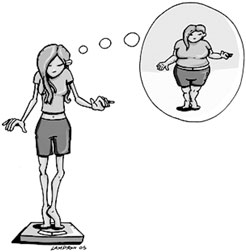|

Are eating disorders serious?

Dr.Priyanga De Zoysa |

Sigrid de Silva, Dietician |
Our perception of 'beauty' is based on our culture and nothing
affects our eating habits more than how we tend to perceive 'beauty'.
People, mostly adolescents, live on strict diets, attempt to cut down on
unhealthy food, try to stick to healthy food while maintaining or
attempting to lose weight just to look beautiful! Is our sense of
'beauty', a result of the western influence? One cannot help but wonder
whether the term 'eating disorder' is just another catchy phrase
resulting from pop culture.
Less than two decades ago eating disorders were virtually unheard of
in Sri Lanka, as is still the case in rural areas of the country, but
not in urban and suburban Sri Lanka. Predominantly juveniles have been
found to be predisposed to eating disorders, unfortunately in Sri Lanka
diagnosis is made much later, after the condition has progressed. This
is mainly due to individual lack of knowledge.
Although females are considered susceptible to eating disorders the
number of males is increasing.
Types of eating disorders
"Two decades ago eating disorders were virtually unknown, 10 years
ago we saw it emerging, five years ago we were concerned, now we are
extremely concerned about the drastic increase of cases related to
eating disorders" said Dietician Sigrid de Silva, Lecturer, Medical
Faculty, Colombo and author of Losers are Winners.
Sigrid explained that not all eating disorders are equally serious.
Anorexia Nervosa - the first identified eating disorder, Bulimia
Nervosa, Compulsive Overeating and Binge Eating Disorder are the main
identified eating disorders.
 Anorexia involves severe food restriction, sometimes associated with
over exercise, Bulimia is self induced vomiting, binge-eating and
subsequent purging involved eating heavy amounts in a fairly short
period of time followed by purging by means of using laxatives,
diuretics or self induced vomiting. Anorexia involves severe food restriction, sometimes associated with
over exercise, Bulimia is self induced vomiting, binge-eating and
subsequent purging involved eating heavy amounts in a fairly short
period of time followed by purging by means of using laxatives,
diuretics or self induced vomiting.
Binge eating - often done in secret - by itself in a patient would
result in gaining weight. Excessive starvation is also observed in
combination with binge eating. "Over-dieting cannot be categorised as
anorexia because it is done haphazardly but rather a result of lack of
knowledge." But she said over-dieting can develop into anorexia later
on. She explained that dieting is safe "as long as it is done the proper
way."
"Although over-exercising isn't exactly an eating disorder it falls
on the purging category" explained Sigrid. She said that some eating
disorders are extremely specific to each suffering individual. "These
traits are so strange that they cannot be categorised."
Causes
When asked whether 'eating disorders' is a concept we 'acquired' from
the west, she explained that although most people disregard it as just
another result of cultural invasion, this problem is very real. "It may
have been a problem of the west exclusively, but it is not so any more."
She identified eating disorders as something stress, competition
related, induced by media or peer pressure. The media has changed Sri
Lankan culture and its people are affected by what is portrayed as
trendy by the media at the time. She explained that people tend to stick
to what is considered cool and fashionable at the time like the 'Twiggy
look' of the 60s in the west.
 Sri Lankan juveniles are now exposed to the 'idolising concept' of
the west through media, which can be considered as a major predisposing
factor. Sri Lankan juveniles are now exposed to the 'idolising concept' of
the west through media, which can be considered as a major predisposing
factor.
Every person has a genetically predetermined body shape and
structure. "Some people chose to live with it while others attempt to
change it in an effort to seek acceptance or due to fear of being
rejected."
Priyanga De Zoysa, one of the best selling authors and a medical
doctor said. He pointed out that culture emphasis on thinness is
specially observed in western societies. He explained that some people
assume there is an ideal size and weight based on what is accepted by
their respective cultures. He explained that the concept of 'figure' is
subjective. "In some cultures plumpness is considered a sign of
prosperity. Eating disorders were virtually unheard of in villages and
indigenous cultures."
Over-dieting is often media induced according to Sigrid, which can be
considered 'imported' from the west. She said that juveniles would
starve themselves of fat diets, internet and email and fashion diets,
simply due to ignorance that food is necessary to sustain life.
She explained that although a patient in any other western country
would attempt to hide his condition, Sri Lankans suffering from eating
disorders are so ignorant even of the existence of such diseases that
they make no effort to hide their behaviour.
Often 'beauty' is a matter of perception. "A big made person may see
him or herself as beautiful, while a slimmer person may think of him or
herself as fat" said Sigrid. But external and psychological factors can
render one susceptible to eating disorders. A special characteristic
observed in females suffering from anorexia is a preference for the
androgynous look.
Even a simple statement like 'this child is fat' or comparing two
children or siblings, at a vulnerable age, can affect a child's
psychology. This would very likely result in an eating disorder.
Moreover, low self esteem and attention problems could trigger eating
disorders, while it can also arise as a means of seeking acceptance or
approval.
Dr. De Zoysa said that a person may resort to eating to pass time
"Different people do different things to pass time" he explained. "Some
listen to music, some surf the net and some others eat."
What initially started off as a habit may later result in an eating
disorder.
Is it psychosocial?
Relatively a few cases are reported from rural areas as opposed to
urban and suburban areas. "Families in rural settings are very closely
knit and family members would be very quick to identify any recent
changes in food habits, although they may not be familiar with eating
disorders." explained Sigrid. Family members put a stop to the condition
before it gets to the level where the patient may pose a threat to his
or her own health.
According to Sigrid, suburban families fail to detect if a member is
suffering from an eating disorder. "Neither patient nor family members
recognize it." She explained that in the suburban setting, because
adolescents are left to their own devices while both parents of most
families work for a living, the tendency to overlook the type of
behaviour that suggests an eating disorder is higher.
 When asked whether eating disorders are a condition predominantly
afflicting the westernised upper class, Sigrid said that she does not
observe the connection, at least not any more. It is not only
adolescents of affluent families who have been diagnosed with eating
disorders." This is mainly due to access to media. Sigrid reiterated the
importance of treating eating disorders head on. She said that the
patient should be made aware of the diagnosis, since they may not even
be aware of their own condition. When asked whether eating disorders are a condition predominantly
afflicting the westernised upper class, Sigrid said that she does not
observe the connection, at least not any more. It is not only
adolescents of affluent families who have been diagnosed with eating
disorders." This is mainly due to access to media. Sigrid reiterated the
importance of treating eating disorders head on. She said that the
patient should be made aware of the diagnosis, since they may not even
be aware of their own condition.
Sigrid explained that this behaviour often go unnoticed. "If the
patient has no idea about eating disorders he will not notice it and it
might take a long time for a family member to notice." The chances of an
eating disorder going unnoticed are heightened in a busy household.
According to her a rather new development is the excuse given by
juveniles for not eating, that they are 'busy on the computer'. "Now
they can get away with not eating using the computer, laptop, iphones
and ipods as excuses." This is why eating disorders are predominantly
encountered in the urban and suburban setting.
Signs and symptoms
Refusal to maintain body weight at or above a minimally normal weight
for age and height, intense fear of gaining weight or becoming fat, even
though underweight are some of the signs to look out for. However, in
many cases the person suffering from an eating disorder does not appear
to be underweight or even average.
In fact, weight is not a reliable sign to look for as far as eating
disorders are concerned. This is exactly why some cases go unnoticed.
Obsession with continuous exercise, bad breath (resulting from
vomiting), hiding food, vague or secretive eating patterns, hair loss,
pale or "grey" appearance to the skin, dizziness and headaches, frequent
soar throats and swollen glands, low blood pressure, loss of menstrual
cycle, constipation or incontinence, bloodshot or bleeding in the eyes,
chronic dieting, frequently out of breath after relatively light
activities, leg and joint pain and even decreased mobility due to weight
gain and weight gain are among other signs.
Going unnoticed.
"In some cases it has taken months and even years for someone to
notice that there is something fishy."
Help is often sought by the time the patient starts to lose hair.
By then the condition has progressed with immense physical as well as
psychological damage. This is a result of ignorance, explained Sigrid.
"Knowledge about eating disorders is very low in Sri Lanka."
She said that the worst thing for her is for a person with an eating
disorder to walk through the door never to return. She explained that
globally 10 to 20 per cent of cases where the disorder is either
overlooked or sufficient action has not been taken, patients die.
"Nobody knows how bad it is in Sri Lanka." She said that the few that
she has treated were in pretty bad shape." She explained that the
further the disorder has progressed the more difficult it would be to
reverse its psychological and dietary effects.
Apart from the psychological damage, people suffering from eating
disorders run the risk of heart disease, high blood-pressure and
cholesterol, impaired liver function, kidney disease or failure,
arthritis and bone deterioration, loss of teeth (due to repeated self
induced vomiting), muscle reduction (including the heart muscle), and
strokes. Eating disorders if not intervened can even lead to death.
Treatment
Treatment is a team effort and depends on the individual suffering
from the disorder, she said. "Sometimes, when the condition progresses,
treatment requires a physician to deal with the physical problems."
Treatment always required a psychologist or a counsellor.
While various people could be suffering from an eating disorder in
various stages, one only seeks medical advice if it comes to a stage
when it is detrimental to health, explained Priyanga De Zoysa. "Every
person has naturally a healthy eating strategy and it is important to
identify which cases depict an eating disorder." But he stressed the
importance of intervention if the person's health is on the line.
"Recovering from an eating disorder is like trying to get out of a
dry well" said Sigrid. "The individual cannot get out on his or her own.
And all we can do is throw in lifelines, it's the patient's choice to
grab hold or not."
The team has to develop a lot of trust. It would sometimes take
twenty tries from the whole combined team to convince the patient to
accept help.
-SP
Precautions to overcome eye disease
by Thulasi MUTTULINGAM
An outbreak of sore eyes, (conjunctivitis) is spreading in some parts
of the country. There are different types of conjunctivitis but what is
commonly found in Sri Lanka is the virus. There is no cure for it but
doctors generally prescribe antibiotics to prevent secondary infection.
 Those afflicted will have swollen red eyes (one eye or both), gritty
or painful feeling in the eye and are eye discharge. It is a highly
contagious disease and the infection spreading agent is mainly in the
eye discharge, according to doctors at the Colombo Eye Hospital. Those afflicted will have swollen red eyes (one eye or both), gritty
or painful feeling in the eye and are eye discharge. It is a highly
contagious disease and the infection spreading agent is mainly in the
eye discharge, according to doctors at the Colombo Eye Hospital.
"Patients can generally get about even with this disease but we
recommend that they stay at home to avoid spreading it to others," said
Dr. Manjula Gamage.
"The disease is not air-borne as some people believe. The main cause
of infection is when people who are infected, touch their eyes and then
touch something else. Anyone who comes into contact with what the
infected person has touched and touches his own eyes will contract the
disease.
The precaution is to wash your hands. If the infected person washes
his hands every time he touches his eyes, the disease could be checked.
Those who come in contact with infected persons should also wash their
hands regularly and avoid touching anything that he or she has used."
The doctor said that people who contract the disease should stay at
home, and attend to all their routine duties. The disease settles on its
own in a day or two according to Dr. Gamage but if it persists the
patient should see a doctor and not consult a pharmacist.
According to her there should be symptomatic treatment for the pain
and redness and antihistamines should be given orally and antibiotics
topically. Steroid eye drops may be given to combat inflammation but the
doctor cautions that this should be prescribed only by a physician.
If the virus is strong, the disease may take a week or even two to
subside. In certain people, however, some complications may arise such
as inflammation extending to the cornea, known as superficial
pankeratitis and it is advisable to consult a doctor if it shows no
signs of improvement.
Daily oral health care for children
Tips
 * Wipe an infant's teeth after feeding, especially along the gum
line, with a soft cloth or soft bristled toothbrush. * Wipe an infant's teeth after feeding, especially along the gum
line, with a soft cloth or soft bristled toothbrush.
* Avoid saliva sharing behaviour such as sharing a spoon when tasting
baby food, cleaning a dropped pacifier by mouth or wiping the baby's
mouth with saliva.
* Avoid saliva-sharing behaviours between children via their toys,
pacifiers, etc.
* Avoid putting the child to bed with a bottle or sippy cup
containing anything other than water.
* Supervise children's brushing and use a small amount of toothpaste
at least twice a day.
* Limit food containing sugar such as to meal times only as the
damage that sugar does depends on how frequently sugar goes into the
mouth and how long it stays in the mouth.
* Avoid sugar-rich foods that stay in the mouth for a long time like
gum with sugar in it, suckers (or lollipops) and other hard candy.
* Avoid soft, sticky foods and sweets that get stuck in the mouth
such as toffee and rolled-up fruit snacks, and potato chips .
* Give nutritious snacks eg. carrot sticks or cheese cubes. Cheese
contains calcium and phosphate, which helps balance pH in the mouth.
-www.brushdayandnight.com
|

